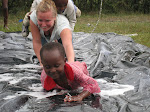 (I was wearing a trucker hat I bought in our village sokoni that says "Texas Proud." Without it, TFFT wouldn't have gotten more than a passing handshake. Who says you've got to dress up when you're meeting the president?)
(I was wearing a trucker hat I bought in our village sokoni that says "Texas Proud." Without it, TFFT wouldn't have gotten more than a passing handshake. Who says you've got to dress up when you're meeting the president?)"Niliwaona kwenye TV jana usiku!! Mlikutana na Bush!!!"
Hunter and I have heard about 20 different variations of the same sentence since February 18, when we got to slap palms with George W. Bush during his one-day stop in Arusha, part of a six-day, five-country Africa visit that ended last week.

"I saw y'all on TV last night!! Y'all got to meet Bush!!!"
Yes we did. Yes, we did.
We also had a bunch of people tell us they were going crazy when we drove past them on the Nairobi-Moshi Rd., when throngs of Tanzanians lined the street waiting to catch a glimpse of the rare V.I.P. to get driving clearance.
"When you drove through Tengeru," our friend from our former village said, "everyone was yelling, 'Hatari! Mwindaji!'"
Thank you, Sister Mary. The invite you sent our way has garnered mad respect for Hunter and I, and for The Foundation For Tomorrow, from all of our Tanzanian compatriots. The names "Danger" and "Hunter" now carry a lot more weight.
Of all the places he could have visited, President Bush's posse somehow put the Emusoi Center for Pastoralist Girls on the list, and it hooked us up big time as a result. Agness, one of the new students placed in Usa River Academy last January by The Foundation For Tomorrow, came from Emusoi, essentially a safe haven for Tanzanian Maasai girls who prefer education to arranged marriages or domestic abuse. When it came time for Sister Mary, the American born nun who runs Emusoi, to whittle down the invite list, somehow we made the cut.
We scratched their backs; they scratched ours. And everybody, including the Maasai warriors hired to perform their traditional dances for the occasion, won in the end.

Say what you want about our 43rd president*, as long as there's an asterisk.
*He has done a lot for Africa.
*Like doubling aid to the continent since taking office in 2001, from about $10 billion in 2000 to $23 billion in 2006.
Tanzania, which just signed a $698 million aid agreement with Washington during the Bush visit, has been especially fortunate.
The proof can be seen in the pudding in Zanzibar, a small island off the coast of the mainland ("Tanzania" as a name came from the merger of Tanganyika and Zanzibar). The $1.2 billion President's Malaria Initiative (PMI) has already shrunk malaria infections among the island's infants from 20 percent to under one percent. And now that PMI is set to expand operations to Tanganyika -- 5.2 million new mosquito nets will begin to be distributed across the country for free within the next six months, theoretically providing one for every Mbongo kid under the age of five -- every Tanzanian should have reason to be thankful to a man so maligned in almost every other continent on earth.
"Vindication comes when you save lives."
I didn't read that in a book or take it from an AP story. I heard those words with my own ears. An elderly American woman seated behind us had elbowed her way to the front row to shake Bush's hand, and when she found herself face to face with the man she loves so much, gushed that she hoped he was "vindicated soon."
He didn't seem too concerned about it, because in his eyes, he already has been vindicated.
The way W replied to that gushing woman essentially sums up the public purpose of his trip to Africa. Just as a person's last days on earth are a time for reflection on his legacy, the end of a president's time in office is also a time for reflection on how he will be judged by history. President Bush doesn't want to be remembered just for what has transpired in the Middle East in the past eight years; he wants people to talk about the positive developments that have transpired under his watch, too.
Which is why he came to Africa, and why he came to Tanzania.
"Without a doubt, this was the most exciting, exhilarating, uplifting trip I've taken since I've been the president," he told a packed house in D.C. this week during a 30-minute "show and tell" slideshow of his six-day visit. "Having the power to save lives comes with the obligation to save lives," Bush said. "This mission rarely makes headlines in the United States."
"We recognize the extraordinary potential of Africa," he continued. "In schoolchildren waving flags on dusty roadsides, to nurses caring for their patients at busy clinics, to artisans selling their products in scorching heat, we saw people who have been given great challenges — and responded to them."
Say what you want about the man. But don't ever say he didn't do good things for Africa.*










